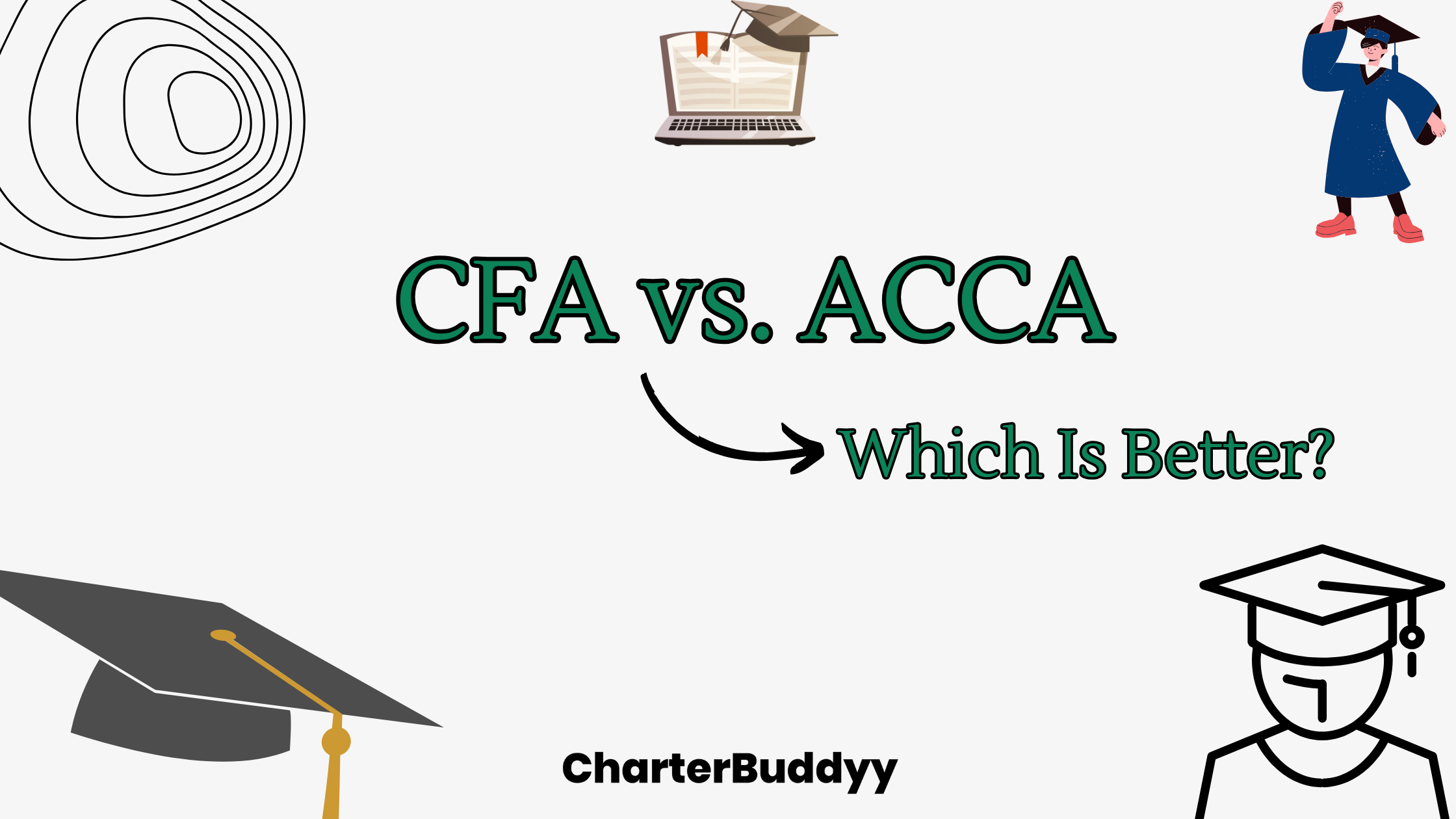CFA vs. ACCA: Key Differences, Curriculum, Career Opportunities in India, Salary, Fees & more
Home » CFA vs. ACCA: Key Differences, Curriculum, Career Opportunities in India, Salary, Fees & more

When it comes to building a career in finance and accounting, two globally recognized qualifications often stand out: the Chartered Financial Analyst (CFA) and the Association of Chartered Certified Accountants (ACCA).
In this blog, we’ll dive deep into a comparison of these two certifications, focusing on their curriculum, career opportunities, exam structure, cost, and salary expectations.
Whether you’re considering the CFA course or the ACCA course, this guide will help you make an informed decision.
Curriculum: CFA vs. ACCA
-
CFA Curriculum
-
ACCA Curriculum
- Applied Knowledge: Basics like financial accounting and management accounting.
- Applied Skills: Taxation, audit, financial reporting, and business law.
- Strategic Professional: Advanced topics like strategic business leadership and financial management.
The CFA program is renowned as the "gold standard" for investment professionals. The course is divided into three levels, covering various core finance topics.
It focuses heavily on advanced investment analysis, portfolio management, and financial markets.
The curriculum emphasizes analytical skills, ethical decision-making, and real-world financial applications, making it ideal for those aiming to excel in investment banking, equity research, or portfolio management.
The ACCA course, administered by the UK-based Association of Chartered Certified Accountants, offers a broader scope centered on accounting, auditing, and business management.
It consists of 13 exams split across three levels:
The ACCA curriculum is versatile, equipping candidates with skills for accounting, taxation, and advisory roles, with a strong emphasis on international financial reporting standards (IFRS).
Key Difference: The CFA dives deep into finance and investments, while ACCA provides a well-rounded foundation in accounting and finance.
Career Opportunities: CFA vs. ACCA
-
CFA Career Opportunities
- Financial Analyst
- Portfolio Manager
- Investment Banker
- Equity Research Analyst
- Risk Manager
-
ACCA Career Opportunities
- Financial Accountant
- Management Accountant
- Auditor
- Tax Advisor
- Finance Manager
Earning the CFA designation opens doors to elite roles in the financial sector, particularly in India’s growing investment market. Common career paths include:
CFA charter holders are highly sought after by investment banks, asset management firms, hedge funds, and private equity companies, both in India and globally.
The ACCA qualification prepares you for a wide range of roles in accounting and finance. In India, ACCA professionals often pursue:
With its global recognition in over 180 countries, this certification is a great fit for those eyeing opportunities in multinational corporations, Big Four firms, or consulting.
Key Difference: CFA is tailored for investment-focused careers, while ACCA offers versatility across accounting, auditing, and financial management.
Exam Structure: CFA Exam vs. ACCA Exam
-
CFA Exam Structure:
- Level I: Multiple-choice questions (MCQs), offered four times a year (February, May, August, November).
- Level II: Vignette-based MCQs, offered thrice a year (May, August and November).
- Level III: Essay questions and vignette-based MCQs, offered twice a year (February and August).
-
ACCA Exam Structure
- Applied Knowledge: 3 exams, computer-based, available on-demand.
- Applied Skills: 6 exams, computer-based, offered quarterly (March, June, September, December).
- Strategic Professional: 4 exams (2 mandatory, 2 optional), offered quarterly.
The CFA exam is a rigorous three-level process:
Each level requires approximately 300 hours of study, and candidates must pass all three sequentially.
The ACCA exam comprises 13 papers across three levels:
Exemptions (up to 9 papers) are available based on prior qualifications, and candidates need three years of practical experience to qualify as an ACCA member. The flexibility of scheduling makes it less rigid than the CFA exam.
Key Difference: The CFA exam is more sequential and investment-focused, while the ACCA exam offers greater flexibility and a broader scope.
Fees: CFA Course Fees vs. ACCA Course Fees
-
CFA Course Fees:
- Enrollment Fee: $350
- Exam Fees per Level: [2025]
- Early registration: $990
- Standard registration: $1,290
- Enrollment Fee: REMOVED
- Exam Fees per Level: [2026]
- Early registration: $1140
- Standard registration: $1490
-
ACCA Course Fees:
- Initial Registration: £89
- Annual Subscription: £137
- Exam Fees: £100–£200 per paper
The CFA course fees include enrollment and exam registration costs, payable in USD:
Note: Fees are set to rise from 2026. The updated fee structure is:
The ACCA course fees vary depending on exemptions and level and are payable in GBP.
Key Difference: CFA course fees are slightly higher due to fewer exams but steeper per-exam costs, while ACCA costs depend on exemptions and spread across more exams.
Salary Expectation in India: CFA vs. ACCA
-
CFA Salary in India:
- Entry-Level: ₹6–8 lakh per annum (e.g., Financial Analyst).
- Mid-Level: ₹12–18 lakh per annum (e.g., Portfolio Manager).
- Senior-Level: ₹20 lakh+ per annum (e.g., Chief Investment Officer).
-
ACCA Salary in India:
- Entry-Level: ₹4–6 lakh per annum (e.g., Financial Accountant).
- Mid-Level: ₹8–12 lakh per annum (e.g., Finance Manager).
- Senior-Level: ₹15 lakh+ per annum (e.g., Global Finance Head).
In India, CFA charterholders command competitive salaries due to their specialized skills:
Salaries soar in investment banking and asset management roles, especially in metro cities like Mumbai and Delhi.
ACCA professionals also enjoy strong earning potential:
Big Four firms and MNCs offer lucrative packages, particularly for those with international exposure.
Key Difference: CFA salaries tend to be higher, especially in investment roles, while ACCA offers solid earnings across diverse finance and accounting positions.
Which Should You Choose: CFA or ACCA?
- Choose CFA if: You’re passionate about finance, investments, and a global career in portfolio management or investment banking. The CFA course is ideal for those who thrive on analytical challenges and want to specialize.
- Choose ACCA if: You prefer a versatile career in accounting, auditing, or financial management with global mobility. The ACCA course suits those seeking flexibility and a broad skill set.
Conclusion
Both the CFA and ACCA are prestigious, but your decision hinges on your career goals. If investments excite you, go for the Chartered Financial Analyst path.
If accounting and business management are your calling, ACCA is the way forward.
Reach out to us and book a free consultation call to clear your career doubts!
Table of Contents
- Curriculum: CFA vs. ACCA
- Career Opportunities: CFA vs. ACCA
- Exam Structure: CFA Exam vs. ACCA Exam
- Fees: CFA Course Fees vs. ACCA Course Fees
- Salary Expectation in India: CFA vs. ACCA
- Which Should You Choose: CFA or ACCA?
- Conclusion

